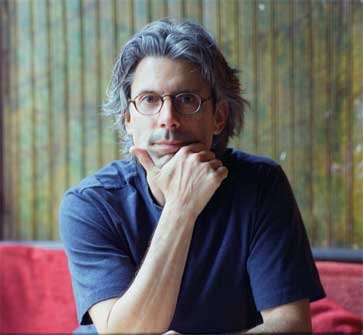Mark Epstein, M.D.
Author of
The Zen of Therapy (Penguin Books, 2023)
Advice Not Given (Penguin Press, 2018)
The Trauma of Everyday Life (Penguin Press, 2013)
Thoughts Without a Thinker: Psychotherapy from a Buddhist Perspective (Basic Books, 2013)
Going on Being (Wisdom Publications, 2009)
Psychotherapy Without the Self: A Buddhist Perspective (Yale University Press, 2007)
Open to Desire: Embracing a Lust for Life (Gotham Press, 2005)
Going to Pieces Without Falling Apart: A Buddhist Perspective on Wholeness (Harmony Press, 1999)
Mark Epstein, M.D. is a psychiatrist in private practice in New York City and the author of a number of books about the interface of Buddhism and psychotherapy, including Thoughts without a Thinker, Going to Pieces without Falling Apart, Going on Being, Open to Desire and Psychotherapy without the Self. His newest work, The Trauma of Everyday Life, will be published in August of 2013 by Penguin Press. He received his undergraduate and medical degrees from Harvard University and is currently Clinical Assistant Professor in the Postdoctoral Program in Psychotherapy and Psychoanalysis at New York University.
Facebook / MarkEpsteinMD.com / Represented by Anne Edelstein
Books by MARK
The Zen of Therapy (Penguin Books, 2023)
A remarkable exploration of the therapeutic relationship, Dr. Mark Epstein reflects on one year’s worth of therapy sessions with his patients to observe how his training in Western psychotherapy and his equally long investigation into Buddhism, in tandem, led to greater awareness—for his patients, and for himself
For years, Dr. Mark Epstein kept his beliefs as a Buddhist separate from his work as a psychiatrist. Content to use his training in mindfulness as a private resource, he trusted that the Buddhist influence could, and should, remain invisible. But as he became more forthcoming with his patients about his personal spiritual leanings, he was surprised to learn how many were eager to learn more. The divisions between the psychological, emotional, and the spiritual, he soon realized, were not as distinct as one might think.
In The Zen of Therapy, Dr. Epstein reflects on a year’s worth of selected sessions with his patients and observes how, in the incidental details of a given hour, his Buddhist background influences the way he works. Meditation and psychotherapy each encourage a willingness to face life’s difficulties with courage that can be hard to otherwise muster, and in this cross-section of life in his office, he emphasizes how therapy, an element of Western medicine, can in fact be considered a two-person meditation. Mindfulness, too, much like a good therapist, can “hold” our awareness for us—and allow us to come to our senses and find inner peace.
Throughout this deeply personal inquiry, one which weaves together the wisdom of two worlds, Dr. Epstein illuminates the therapy relationship as spiritual friendship, and reveals how a therapist can help patients cultivate the sense that there is something magical, something wonderful, and something to trust running through our lives, no matter how fraught they have been or might become. For when we realize how readily we have misinterpreted our selves, when we stop clinging to our falsely conceived constructs, when we touch the ground of being, we come home.
PRAISE
“A warm, profound and cleareyed memoir. . . this wise and sympathetic book’s lingering effect is as a reminder that a deeper and more companionable way of life lurks behind our self-serious stories."—Oliver Burkeman, New York Times Book Review
Advice Not Given (Penguin Press, 2018)
Our ego, and its accompanying sense of nagging self-doubt as we work to be bigger, better, smarter, and more in control, is one affliction we all share. And, while our ego claims to have our best interests at heart, in its never-ending pursuit of attention and power, it sabotages the very goals it sets to achieve. In Advice Not Given, Dr. Mark Epstein reveals how Buddhism and Western psychotherapy, two traditions that developed in entirely different times and places and, until recently, had nothing to do with each other, both identify the ego as the limiting factor in our well-being, and both come to the same conclusion: When we give the ego free reign, we suffer; but when it learns to let go, we are free.
With great insight, and in a deeply personal style, Epstein offers readers a how-to guide that refuses a quick fix, grounded in two traditions devoted to maximizing the human potential for living a better life. Using the Eightfold Path, eight areas of self-reflection that Buddhists believe necessary for enlightenment, as his scaffolding, Epstein looks back productively on his own experience and that of his patients. While the ideas of the Eightfold Path are as old as Buddhism itself, when informed by the sensibility of Western psychotherapy, they become something more: a road map for spiritual and psychological growth, a way of dealing with the intractable problem of the ego. Breaking down the wall between East and West, Epstein brings a Buddhist sensibility to therapy and a therapist’s practicality to Buddhism. Speaking clearly and directly, he offers a rethinking of mindfulness that encourages people to be more watchful of their ego, an idea with a strong foothold in Buddhism but now for the first time applied in the context of psychotherapy.
Our ego is at once our biggest obstacle and our greatest hope. We can be at its mercy or we can learn to mold it. Completely unique and practical, Epstein’s advice can be used by all–each in his or her own way–and will provide wise counsel in a confusing world. After all, as he says, “Our egos can use all the help they can get.”
PRAISE:
“Most people will never find a great psychiatrist or a great Buddhist teacher, but Mark Epstein is both, and the wisdom he imparts in Advice Not Given is an act of generosity and compassion. The book is a tonic for the ailments of our time.” —Ann Patchett, New York Times bestselling author of Commonwealth
“Mark Epstein’s Advice Not Given continues his important, fascinating work in exceptionally lucid language. It also offers its readers a collection of fables, vignettes, and personal revelations with the true capacity to rearrange one’s perspective, even change one’s life. I suspect many of these offerings will stay with me for the long haul, for which I’m very grateful.”—Maggie Nelson, New York Times bestselling author of The Argonauts
“In Advice Not Given Mark Epstein shares his remarkably practical wisdom, borne of a brilliant interchange between the fundamentals of Buddhism and the insights of psychotherapy. We all can benefit from this advice, given here freely.”—Daniel Goleman, New York Times bestselling author of Altered Traits and Emotional Intelligence
The Trauma of Everyday Life (Penguin Press, 2013)
Trauma does not just happen to a few unlucky people; it is the bedrock of our psychology. Death and illness touch us all, but even the everyday sufferings of loneliness and fear are traumatic. In The Trauma of Everyday Life renowned psychiatrist and author of Thoughts Without a Thinker Mark Epstein uncovers the transformational potential of trauma, revealing how it can be used for the mind’s own development.
Western psychology teaches that if we understand the cause of trauma, we might move past it while many drawn to Eastern practices see meditation as a means of rising above, or distancing themselves from, their most difficult emotions. Both, Epstein argues, fail to recognize that trauma is an indivisible part of life and can be used as a lever for growth and an ever deeper understanding of change. When we regard trauma with this perspective, understanding that suffering is universal and without logic, our pain connects us to the world on a more fundamental level. The way out of pain is through it.
Epstein’s discovery begins in his analysis of the life of Buddha, looking to how the death of his mother informed his path and teachings. The Buddha’s spiritual journey can be read as an expression of primitive agony grounded in childhood trauma. Yet the Buddha’s story is only one of many in The Trauma of Everyday Life. Here, Epstein looks to his own experience, that of his patients, and of the many fellow sojourners and teachers he encounters as a psychiatrist and Buddhist. They are alike only in that they share in trauma, large and small, as all of us do. Epstein finds throughout that trauma, if it doesn’t destroy us, wakes us up to both our minds’ own capacity and to the suffering of others. It makes us more human, caring, and wise. It can be our greatest teacher, our freedom itself, and it is available to all of us.





